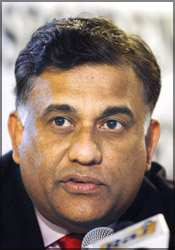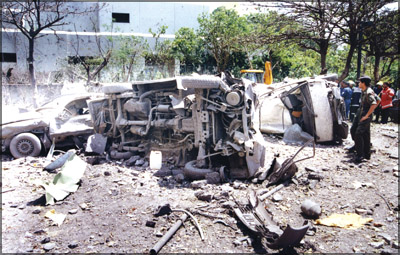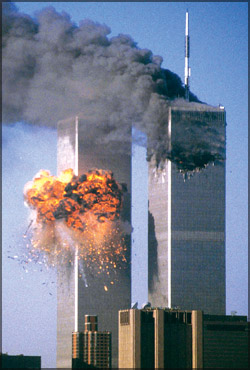Global action on counterung terror: Lanka’s perspective
Excerpts from the speech by Rohitha Bogollagama, Minister of Foreign
Affairs at the Australian Strategic Policy Institute, Canberra last week
Since 1963, the international community has elaborated 13 universal
legal instruments to prevent terrorist acts. Those instruments were
developed under the auspices of the United Nations and its specialised
agencies and the international Atomic Energy Agency (IAEA) and are open
to participation by all Member States.
 Currently, UN Member States are negotiating a 14th international
treaty, a draft comprehensive convention on international terrorism.
This convention would complement the existing framework of international
anti-terrorism instruments and would build on key guiding principles
already present in recent anti-terrorist conventions: the importance of
criminalisation of terrorist offences, making them punishable by law and
calling for prosecution or extradition of the perpetrators; the need to
eliminate legislation which establishes exceptions to such
criminalization on political, philosophical, ideological, racial,
ethnic, religious or similar grounds; a strong call for Member States to
take action to prevent terrorist acts; and emphasis on the need for
Member States to cooperate, exchange information and provide each other
with the greater measurer of assistance in connection with the
prevention, investigation and prosecution of terrorist acts. Currently, UN Member States are negotiating a 14th international
treaty, a draft comprehensive convention on international terrorism.
This convention would complement the existing framework of international
anti-terrorism instruments and would build on key guiding principles
already present in recent anti-terrorist conventions: the importance of
criminalisation of terrorist offences, making them punishable by law and
calling for prosecution or extradition of the perpetrators; the need to
eliminate legislation which establishes exceptions to such
criminalization on political, philosophical, ideological, racial,
ethnic, religious or similar grounds; a strong call for Member States to
take action to prevent terrorist acts; and emphasis on the need for
Member States to cooperate, exchange information and provide each other
with the greater measurer of assistance in connection with the
prevention, investigation and prosecution of terrorist acts.
The Global Counter-Terrorism Strategy, which was adopted by the UN
General Assembly on 08 September 2006, highlighted the importance of
Member States becoming parties to existing international
counter-terrorism instruments and implementing their provisions without
delay. This was first time that countries around the world agreed on a
common strategic approach to combat terrorism.
Terrorism is, sadly, no stranger to Sri Lanka. We, in Sri Lanka, know
terrorism, unfortunately, only too well. It is regrettably an everyday
reality confronting us, even as we try to commute to our work places and
attend to our daily chores.
We know at first hand the horrific consequences of the brutality of
terrorism; the carnage, the shock and horror, the thousands of
unsuspecting lives lost or maimed in the flash of a bomb explosion, the
thousands of families left bereaved, the countless personal tragedies
that terrorism leaves in its wake. The debilitating effects of terrorism
on the psyche of the nation have been such that an entire generation has
been born and raised in Sri Lanka under the dark clouds of this scourge.
Sri Lanka is a State party to 12 international conventions relating
to terrorism. The most recent instrument that we ratified was the
International Convention for the Suppression of Acts of Nuclear
Terrorism, which was negotiated and concluded in April 2005 by the UN Ad
Hoc Committee on Terrorism, under the Chair of Sri Lanka. Currently, a
Bill to give effect to this Convention has been gazetted and will be
presented to Parliament shortly for adoption into domestic law.
At the regional level too, Sri Lanka has played a pro-active role in
galvanizing support for collective action in combating terrorism. At the
recently concluded 15th SAARC Summit in Colombo, leaders of the
assembled eight member states gave their blessings to the SAARC
Convention on Mutual Legal Assistance in Criminal Matters, which was
signed by the Foreign Ministers.
|

An LTTE attack in Sri Lanka |
Among the key weapons in the armoury of the international community
to fight terrorism is the International Convention for the Suppression
of the Financing of Terrorism, which entered into force on 10 April
2002, following its adoption by the UN General Assembly in December
1999.
The speed with which member states ratified this Convention,
illustrated the commitment of the international community to combat
terrorism, especially in the immediate aftermath of the terrorist
attacks on the US in September 2001.
In response to those attacks, the UN Security Council acting under
Chapter VII of the UN Charter, adopted Resolution 1373 on 28 September
2001, which inter aliacalled upon States to “become parties as soon as
possible to the relevant international conventions and protocols
relating to terrorism, including the International Convention for the
Suppression of the Financing of Terrorism of 09 December 1999”.
Increasingly, international terrorist activity has become interlinked
with other modern scourges, such as drug trafficking and the
proliferation of small arms. This Convention recognizes that financing
is at the heart of terrorist activity, and it paves the way for
concerted action and close cooperation among law enforcement agencies,
financial authorities and States.
It calls for efforts to identify, detect, and freeze or seize any
funds used or allocated for the purpose of committing a terrorist act.
It urges States to consider establishing mechanisms to use such funds to
compensate victims and/or their families.
The Liberation Tigers of Tamil Eelam (LTTE) which has earned
international notoriety and opprobrium for its countless cold blooded
and savage acts of terrorism, targeting not only high profile
politicians and military personnel, but ordinary civilians, designed to
cause maximum casualties and property destruction, is a prime candidate
for consideration by the Working Group for listing, as an international
terrorist group. The LTTE is pre-eminently qualified to meet the
criteria for such listing.
After all, the LTTE has been described as “probably the most
sophisticated terrorist organization in the world”, by Dr. Magnus
Ranstorp, Chief Scientist at the Centre Asymmetric Threat Studies of the
Swedish National Defence College. More recently, the FBI of the United
States has given the LTTE the appellation as “among the most dangerous
and deadly extremists in the world”.
I do hope the UN Working Group will take cognizance of the clear and
present danger that the LTTE poses not only to the sovereignty and
territorial integrity of Sri Lanka, but equally to the law and order as
well as the stability of Western societies, which have been infected by
the pernicious and malignant influence of the LTTE.
The LTTE is notorious for resorting to intimidation, extortion and
even violence on the large Sri Lankan Tamil diaspora in the West to
ensure a steady flow of funds to finance its terrorist campaign in Sri
Lanka.
Funding from the diaspora has been the mainstay fuelling the LTTE’s
terror campaign in Sri Lanka. The traditional “melting pot” paradigm,
where emigrants gradually lost ties to their countries of origin and
became assimilated into the social fabric of their adopted nations, is
no longer the norm.
The LTTE, running a highly sophisticated and intricate international
web, encompassing the whole gamut of activities ranging from seemingly
innocuous pursuits, such as the promotion of Tamil culture to raising
funds ostensibly to support charities and humanitarian relief in Sri
Lanka, has cleverly exploited modern technology to finance its terror
campaign.
In fact, although several countries including India, the United
States, the United Kingdom, the 27 member European Union and Canada have
proscribed the LTTE, the many front organizations of the LTTE which
operate rather freely in these countries, continue to raise funds and
engage in propaganda in support of the LTTE. These fronts provide a
cover for the LTTE to indulge in various nefarious activities, including
illicit arms procurement, human smuggling, narcotics trafficking, credit
card scams and money laundering.
All too often there is a tendency to lose sight of the meticulous
organization behind each act of terrorism, the extensive network of
secret cells, responsible for collecting funds, procuring illicit
weapons and bomb making material, and foot soldiers responsible for
propaganda. The ability of the LTTE to transfer vast sums money through
illicit channels, bypassing the scrutiny of Central Banks of
Governments, is a major challenge in combating terrorism.
We greatly appreciate the pro-active stance of the Australian
authorities in arresting and prosecuting frontline activists and
sympathizers of the LTTE, notwithstanding the fact that Australia is yet
to proscribe the LTTE as a terrorist organization. Hence, the arrest of
three activists of the Melbourne based LTTE front, the Tamil
Coordinating Committee in April 2007 by the Australian Federal Police
and their subsequent prosecution on charges relating to raising funds
for terrorism, is all the more welcome.
We also note that the Australian Federal Police have arrested the
Director of a Melbourne business college in July this year, at the
request of the FBI of the US, for his links to the LTTE, and wanted to
face prosecution for alleged terrorism offences in the US.
However, much more needs to be done to pursue front organizations of
the LTTE, posing off as charities and humanitarian relief groups, which
continue to raise funds to fill the LTTE war chest.
In this respect, the United States has taken a bold lead in targeting
the support network of the LTTE by designating the Tamils Rehabilitation
Organization (TRO), which had long claimed itself to be a charitable
organization, as a front to facilitate fund raising and procurement of
weapons for the LTTE.”
Notwithstanding the overwhelming body of evidence that is available
with several governments on the inextricable and organic link between
the TRO and the LTTE, it is a matter of regret that apart from the US
and the UK governments which have listed the TRO, this organization as
well as numerous other fronts, representing the multi-headed hydra like
character of the LTTE, are operating with impunity, thumbing a nose at
the authorities in many Western countries which have a significant
presence of the Sri Lankan Tamil diaspora.
Thus, the onus is now clearly upon the international community to
support Sri Lanka, by taking tangible and meaningful steps to eradicate
terrorism from our land, and help the government to restore democracy
and rebuild the damaged infrastructure in the North and the East of the
country. We believe that the true friends of Sri Lanka in the
international community, who have the well being of our people at heart
must put their money where their mouth is, by taking decisive action to
stop funds being raised under various ruses, which are being channeled
to finance the LTTE’s operations.
We strongly believe that terrorism cannot be countered by using
terrorism; we reject the notion that terror must be fought by terror.
While this approach has found favour in certain quarters, giving rise
to robust rules of engagement for the military to engage terrorists, in
turn, resulting in
|

9/11 attack in NewYork |
collateral damage in the form of massive civilian
casualties, Sri Lanka firmly believes in the protection of human rights,
even as its military forces are currently engaged in freeing our people
from the fascist and dictatorial control of the LTTE terrorists, who are
now holed up in parts of the Kilinochchi and Mullaitivu districts in the
North.
The Government of Sri Lanka is deeply concerned about the
humanitarian situation of civilians in the uncleared areas, as the
military operations enter a decisive phase to free these areas from the
terrorists. As a responsible government, President Mahinda Rajapaksa’s
administration is acutely conscious and aware of its responsibilities
towards all citizens of Sri Lanka.
This is why, even as there is intensification of the military strikes
against the LTTE, there is remarkably minimal collateral civilian
casualties. This has not occurred by chance or a fortuitous turn of
circumstances, but rather in pursuance of the government directive to
the military to adhere strictly to a policy of “zero civilian casualty”,
in combating terrorism.
The absence of civilian deaths in the Eastern Province clearing
operations last year, except in one isolated incident where the LTTE
used civilians as cover to fire at the military, is a manifestation of
the success of this strategy, which we are confident, will be replicated
in the ongoing operations in the North.
While it should come as no surprise that critics of Sri Lanka and
sympathizers of the LTTE are attempting to portray a misleading and
totally false notion that the government is opting for a military
solution to address the problems of the minorities, it is unfortunate
that some of our friends too have been influenced by this malicious
propaganda.
Nothing can be further from the truth. In fact, President Mahinda
Rajapaksa addressing the 63rd session of the UN General Assembly in New
York last month, made it amply clear to the international community that
the Government of Sri Lanka is firmly committed to a political solution.
The Government attaches the highest importance to the humanitarian
needs of displaced persons and civilians in the areas affected by the
conflict. This is an obligation and responsibility which the Government
has assumed since the inception of the conflict.
The civilians who are trapped in the LTTE controlled areas are being
encouraged to move out of these areas through “humanitarian corridors”
created in order that the security forces can put an end to terrorism in
Sri Lanka and prevent them being used by the LTTE as “human shields”.
It is highly deplorable that the LTTE is cynically exploiting the
plight of innocent civilians kept prisoner against their will, for
propaganda purposes. With regard to Internally Displaced Persons (IDPs)
in LTTE dominated areas in the Killinochchi and Mullativu districts, the
current estimate is around 250,000, of which there are 110,000 pre-2006
IDPs forced to flee to the Wanni by the LTTE from the Jaffna peninsula,
another 90,000 who were displaced between 2006 and June 2008 and the
rest displaced due to the on-going operations. In considering the
situation of the IDPs, it is important that we bear in mind that the
situation of those displaced due to the on-going military operations in
the Wanni, as previously in the case of the East, is merely a temporary
dislocation.
On the other hand, I wonder why the shrill voices of those who are
screaming of a non-existent humanitarian catastrophe in the Wanni, are
deafeningly silent on the plight of the over 100,000 Muslims who are now
languishing in refugee camps, mainly in the impoverished Puttalam
district and others in the Anuradhapura and Polonnaruwa districts after
being forcibly evicted by the LTTE from the North. 24th October marks
the 18thanniversary of the ethnic cleansing of Muslims from the North by
the LTTE.
More than 75,000 Muslims were compelled to vacate their homes at gun
point on this day in 1990 by the LTTE and after they were driven out of
their lands, which they had inhabited from time immemorial, the LTTE
went about systematically looting and pillaging the properties and
valuables of these hapless people. If any proof were needed of the
racist nature of the LTTE, the ethnic cleansing of Muslims from the
North, speaks for itself - res ipsa loquitur.
It is very important that all those who are concerned about Sri Lanka
including the welfare of the Tamil community should perceive the
marginalisation of the LTTE in the correct light. LTTE does not
represent the Tamil community in Sri Lanka. Therefore, military action
against the LTTE should never be perceived as action against our
brethren, the Tamil community. We are concerned about them and will work
with them to ensure their welfare, security and aspirations since they
are our fellow citizens.
Sri Lanka, a party to all major UN Conventions relating to terrorism,
and playing an active role as Chair of the General Assembly’s Ad Hoc
Committee on the Elimination of International Terrorism, will continue
to urge all member nations to ratify them so as to give real meaning to
the intent of the drafters, who have toiled through sleepless nights in
lengthy and exhaustive negotiations to produce these important legally
binding instruments, and thus implement their provisions in letter and
spirit.
Nothing short of this commitment would suffice in the global struggle
to eliminate the modern day scourge of terrorism. |

